- Home
- Gail Carriger
Changeless pp-2 Page 4
Changeless pp-2 Read online
Page 4
“Engaged, Miss Hisselpenny?” In addition to his disheveled aspect, Tunstell was looking quite tragic, in a Shakespearean comedy kind of way. From behind the handkerchief, his eyes were wide in distress. Tunstell had been mighty taken with Miss Hisselpenny ever since they danced together at Lord and Lady Maccon’s wedding, but they had not been allowed to mingle socially since. Miss Hisselpenny was a lady of consequence, and Tunstell was but a lowly claviger and an actor to boot. Alexia had not comprehended the extent of his attachment. Or perhaps the attachment meant more now that it was no longer possible.
“To whom?” Lady Maccon asked the obvious question.
Ivy ignored her and dashed to Tunstell’s side.
“You are injured!” she gasped, bunches of grapes and silk strawberries bobbing about. She pulled out her own minuscule handkerchief, embroidered with small clusters of cherries, and dabbed at his face unhelpfully.
“A mere scratch, Miss Hisselpenny, I assure you,” said Tunstell, looking pleased by her ministrations, as ineffectual as they may be.
“But you are bleeding, simply gouts and gouts of it,” insisted Ivy.
“Not to worry, not to worry, the business end of a fist will do that to a person, you know.”
Ivy gasped. “Fisticuffs! Oh, how perfectly horrid! Poor Mr. Tunstell.” Ivy petted an unbloodied corner of the man’s cheek with her white-gloved hand.
Poor Mr. Tunstell did not seem to mind, if this was the result. “Oh, please, do not trouble yourself so,” he said, leaning into her caress. “My, what an enchanting hat, Miss Hisselpenny, so”—he hesitated, searching for the right word—“fruity.”
Ivy blushed beet red at that. “Oh, do you like it? I bought it specially.”
That did it. “Ivy,” said Alexia sharply, bringing her friend back around to the important business at hand. “To whom have you gotten yourself engaged, exactly?”
Miss Hisselpenny snapped back to the present, drifting away from the alluring Mr. Tunstell. “His name is Captain Featherstonehaugh, and he has just returned with the Northumberling Fusilli, all the way from Inja.”
“You mean the Northumberland Fusiliers.”
“Is that not what I just said?” Ivy was all big-eyed innocence and excitement.
The dewan’s army reshuffling clearly involved far more regiments than Alexia had thought. She would have to find out what the queen and her commanders were about at the Shadow Council meeting.
The meeting she was now inexcusably late for.
Miss Hisselpenny continued. “It is not a bad match, although Mama would have preferred a major at the very least. But you know”—she lowered her voice to almost a whisper—“I haven’t really the luxury of choice at my age.”
Tunstell looked quite put out upon hearing that. He thought Miss Hisselpenny a grand catch, older than he to be sure, but imagine her having to settle on a mere captain. He opened his mouth to say so but showed unexpected restraint upon receipt of a high-stakes glare from his mistress.
“Tunstell,” instructed Lady Maccon, “go away and be useful. Ivy, felicitations on your impending nuptials, but I really must be off. I have an important meeting, for which I am now late.”
Ivy was watching Tunstell’s retreating back. “Of course, Captain Featherstonehaugh was not exactly what I had hoped for. He is quite the military man, you understand, very stoic. That kind of thing would seem to suit you, Alexia, but I had hoped for a man with the soul of a bard.”
Alexia threw her hands up into the air. “He is a claviger. You know what that means? Someday, relatively soon, he will petition for metamorphosis and then probably die in the attempt. Even if he came through intact, he would then be a werewolf. You don’t even like werewolves.”
Ivy gave her an even-wider-eyed look as if butter wouldn’t melt in her mouth. The grapes bobbed. “He could always leave before that.”
“To be what? A professional actor? Living on a penny a day and the approbation of a fickle public?”
Ivy sniffed. “Who says we are discussing Mr. Tunstell?”
Alexia was driven to distraction. “Get into the carriage, Ivy. I shall take you back to town.”
Miss Hisselpenny nattered on about her impending marriage and its companion apparel, invitation list, and comestibles for the entirety of the two-hour ride into London. Not much was said, however, about the prospective groom. Alexia was made to realize, during the course of that drive, that he apparently was of little consequence to the proceedings. She watched her friend climb down and trot inside the Hisselpenny’s modest town house with a slight pang of concern. What was Ivy doing? But with no time at the moment to worry over Miss Hisselpenny’s situation, Lady Maccon directed the driver on to Buckingham.
The guards were expecting her. Lady Maccon was always at the palace two hours after dark on Sundays and Thursdays without fail. And she was one of the most unproblematic of the queen’s regular visitors, being the least high-and-mighty, for all her forthright tone and pointed opinions. After the first two weeks, she had even gone to the trouble of learning all of their names. It was the little things that made someone grand. The ton were suspicious of Lord Maccon’s choice, but the military was rather pleased with it. They welcomed straightforward talk, even from a female.
“You are late, Lady Maccon,” said one, checking her neck for bite marks and her dispatch case for illegal steam devices.
“Don’t I know it, Lieutenant Funtington, don’t I know it,” replied the lady.
“Well, we shan’t keep you. Go on in, my lady.”
Lady Maccon gave him a tight smile and went.
The dewan and the potentate were already waiting for her. Queen Victoria was not. The queen usually arrived nearer to midnight, after presiding over her family and supper, and stayed only to hear the results of their debate and formulate any final decisions.
“I cannot apologize enough for having kept you both,” said Alexia. “I had unexpected squatters on my front lawn and an equally unexpected engagement to handle this evening. No excuses, I know, but those are my reasons.”
“Well, there you have it,” snarled the dewan, “The affairs of the British Empire must wait on squatters and your good graces.” Landed as the Earl of Upper Slaughter but without any real country seat, the dewan was one of the few werewolves in England who could give the Earl of Woolsey a fight for his fur and had had occasion to prove it. He was almost as big as Conall Maccon but slightly older-looking, with dark hair, a wide face, and deep-set eyes. He ought to have been handsome, except that his mouth was a little too full, the cleft in his chin a little too pronounced, and his mustache and muttonchops astonishingly assertive.
Alexia had spent long hours wondering over that mustache. Werewolves did not grow hair, as they did not age. Where had it come from? Had he always had it? For how many centuries had his poor abused upper lip labored under the burden of such vegetation?
Tonight, however, she ignored both him and his facial protuberances. “So,” she said, sitting down and placing the dispatch case on the table next to her, “shall we on to business?”
“By all means,” replied the potentate, his voice honeyed and cool. “Are you feeling well this evening, muhjah?”
Alexia was surprised by the question. “Quite.”
The vampire member of the Shadow Council was the more dangerous of the two. He had age on his side and much less to prove than the dewan. Also, while the dewan made a show of disliking Lady Maccon for form’s sake, Alexia knew for a fact that the potentate actually loathed her. He had registered an official complaint in writing on the occasion of her marriage to the Woolsey Pack Alpha and the same again when Queen Victoria brought her in to sit on the Shadow Council. Alexia had never discerned exactly why. But he had the support of the hives in this as in most things, which made him far more powerful than the dewan, for whom pack loyalty seemed wobbly.
“No stomach ailments?”
Alexia gave the vampire a suspicious look. “No, none. Could we get on?”
> Generally, the Shadow Council administered supernatural interaction with the Crown. While BUR handled enforcement, the Shadow Council dealt with legislative issues, political and military guidance, and the occasional sticky-residue snafu. During Alexia’s few months on board, discussions had ranged from hive authorization in the African provinces, to military code covering the death of an Alpha overseas, to neck-exposure mandates in public museums. They had not yet had a genuine crisis to deal with. This, Alexia felt, was going to be interesting.
She snapped open the lid of her dispatch case and extracted her harmonic auditory resonance disruptor, a spiky little apparatus that looked exactly like two tuning forks sticking out of a crystal. She tapped one fork with her finger, waited a moment, and then tapped the other. The two produced a discordant, low-pitched humming noise, amplified by the crystal that would prevent their conversation from being overheard. She placed the device carefully in the middle of the massive meeting table. The sound was annoying, but they had all learned to deal with it. Even inside the security of Buckingham Palace, one could never be too careful.
“What, exactly, has happened in London this evening? Whatever it was had my husband up scandalously early, just after sunset, and my local ghost informant in a positive fluster.” Lady Maccon removed her favorite little notebook and a stylographic pen imported from the Americas.
“You do not know, muhjah?” sneered the dewan.
“Of course I know. I am simply wasting everyone’s time by inquiring, for my own amusement.” Alexia was sarcastic to the last.
“Neither of us look any different to you this evening?” The potentate steepled his long fingers together on the tabletop, pure white and snakelike against the dark mahogany, and looked at her out of beautiful, deep-set green eyes.
“Why are you humoring her? Obviously she must have something to do with it.” The dewan stood and began to pace about the room—his customary restless state during most of their meetings.
Alexia pulled her favorite glassicals out of her dispatch case and put them on. They were properly called monocular cross-magnification lenses with spectral modifier attachment, but everyone was calling them glassicals these days, even Professor Lyall. Alexia’s were made of gold, inset with decorative onyx around the side that did not boast multiple lenses and a liquid suspension. The many small knobs and dials were also made of onyx, but the expensive touches did not stop them from looking ridiculous. All glassicals looked ridiculous: the unfortunate progeny of an illicit union between a pair of binoculars and opera glasses.
Her right eye became hideously magnified out of all proportion as she twiddled one dial, homing in on the potentate’s face. Fine even features, dark eyebrows, and green eyes—the face seemed totally normal, natural even. The skin looked healthy, not so pale. The potentate gave a little smile, all his teeth in perfect boxlike order. Remarkable.
There would be the problem. No fangs.
Lady Maccon stood and went to stand in front of the dewan, stopping him in his impatient movements. She trained the glassicals upon his face, focusing on the eyes: plain old brown. No yellow about the iris, no hidden quality of open-field or hunter instincts.
In silence, thinking hard, she sat back down. Carefully, she removed the glassicals and put them away.
“Well?”
“Am I to understand you are both laboring under a state, that is, afflicted with, um”—she groped for the correct way of putting it—“that is, infected by… normality?”
The dewan gave her a disgusted look. Lady Maccon made a note in her little journal.
“Astonishing. And how many of the supernatural set are also contaminated into being mortal?” she asked, stylographic pen poised.
“Every vampire and werewolf in London central.” The potentate was incurably calm.
Alexia was truly stunned. If all of them were no longer supernatural, that meant that any or all of them could be killed. She wondered, as a preternatural, if she was being affected. She went introspective for a moment. She felt like herself—difficult to tell, though.
“What’s the geographical extent of those disabled?” she asked.
“It seems to be concentrated around the Thames embankment area, extending in from the docklands.”
“And if you leave the affected zone, do you return to your supernatural state?” the scientific side of Alexia instantly wanted to know.
“Excellent inquiry.” The dewan disappeared out the door, presumably to send a runner to find out the answer to that question. Normally they would have had a ghost agent handle such a job. Where was she?
“And the ghosts?” Lady Maccon asked, frowning.
“That is how we know the extent of the afflicted area. Not a single ghost tethered in that zone has appeared since sundown. Every one has vanished. Exorcised.” The potentate was watching her closely. He, of course, would assume Alexia had something to do with this. Only one creature had the inherent power to exorcise ghosts, as unpleasant a job as it was, and that creature was a preternatural. Alexia was the only preternatural in the London locale.
“Gods,” breathed Lady Maccon. “How many ghosts lost were in the Crown’s employ?”
“Six worked for us; four worked for BUR. Of the remaining specters, eight were in the poltergeist stage, so no one misses them, and eighteen were at the end stages of disanimus.” The potentate tossed a pile of paperwork in Alexia’s direction. She flipped through the stack, looking at the details.
The dewan came back into the room. “We will know your answer within the hour.” He resumed his pacing.
“In case you are curious, gentlemen, I spent the entire day asleep at Woolsey Castle. My husband can attest to that fact, as we do not maintain separate bedrooms.” Alexia blushed slightly but felt her honor demanded she stand up for herself.
“Of course he can,” said the vampire who currently was no vampire at all but a natural human. For the first time in hundreds of years. He must be absolutely shaking in those hugely expensive Hessian boots of his. To face mortality after so very long. Not to mention the fact that one of the hives was in the afflicted zone—which meant a queen was in danger. Vampires, even roves like the potentate, would do almost anything to protect a queen.
“You mean, your werewolf husband who sleeps daylight solid. And whom I highly doubt you touch while you sleep?”
“Of course I do not.” Alexia was taken aback that he need ask. Staying in contact with Conall all night, every night, would cause him to age, and while she abhorred the idea of growing old without him, she wasn’t about to inflict mortality on him. He would also grow facial hair and come over more than usually scruffy of a morning.
“So you admit you could have snuck out of the house?” The dewan stopped pacing and glared at her.
Lady Maccon made a clucking noise of denial. “Have you met my staff? If Rumpet didn’t stop me, Floote would, not to mention Angelique running about fussing over my hair. Sneaking out, I am sorry to say, is a thing of my past. But you are welcome to blame me if you are too lazy to try and figure out what is really going on here.”
The potentate, of all people, seemed a little more convinced. Perhaps it was simply that he did not want to believe she had access to such an ability.
Alexia continued. “I mean, really, how could one preternatural, however powerful, affect an entire area of the city? I have to touch you in order to force your humanity. I have to touch a dead body in order to exorcise its ghost. I could not possibly manage to be in all those places at once. Besides which, I am not touching you right now, am I? And you are both mortal.”
“So what are we dealing with? A whole pack of preternaturals?” That was the dewan. He was prone to thinking in numbers, the consequence of an overabundance of military training.
The potentate shook his head. “I have seen BUR’s records. There are not enough preternaturals in all of England to exorcise so many ghosts at once. There are probably not enough in the civilized world.”
Alexia wonde
red how he had seen such records. She would have to tell her husband about that. Then she returned her attention to the business at hand. “Is there anything more powerful than a preternatural?”
The not-vampire shook his head again. “Not in this particular way. Vampire edict tells us that soul-suckers are the second most deadly creatures on the planet. But it also says that the most deadly of all is no leech, but a different kind of parasite. This cannot be the work of one of them.”
Lady Maccon scribbled this down in her book. She was intrigued and a little put out. “Worse than us soul-suckers? Is that possible? And here I was thinking myself a member of the most hated set. And what do you call them?”
The potentate ignored this question. “That will teach you to get full of yourself.”
Alexia would have pressed the issue but suspected that line of questioning would be ignored. “So this must be the result of a weapon, a scientific apparatus. That is the only possible explanation.”
“Or we could take that ridiculous man Darwin’s theories to heart and postulate a newly evolved species of preternatural.”
Alexia nodded. She had her reservations about Darwin and his prattle on origins, but there might be some little merit to his ideas.
The dewan, however, pooh-poohed the idea. Werewolves were, largely, of a much less scientific bent than vampires, except where advances in weaponry were concerned. “I am more sympathetic to the muhjah on this point if nothing else. If she isn’t doing it herself, then it must be some newfangled contrivance of technical origin.”
“We are living in the Age of Invention,” agreed the potentate.
The dewan looked thoughtful. “The Templars have finally managed to unify Italy and declare themselves Infallible; perhaps they are turning their attention outward once more?”
“You think this may herald a second Inquisition?” The potentate blanched. He could do that now.
The dewan shrugged.
“There is no point in wild speculation,” said the ever-practical Lady Maccon. “Nothing suggests that the Templars are involved.”

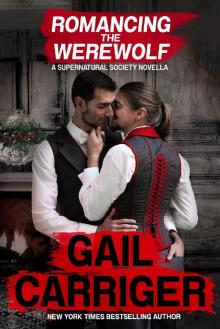 Romancing the Werewolf
Romancing the Werewolf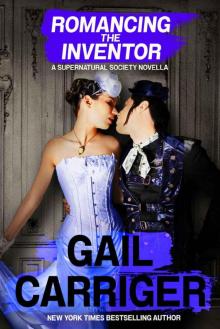 Romancing the Inventor
Romancing the Inventor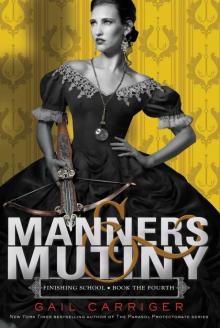 Manners & Mutiny
Manners & Mutiny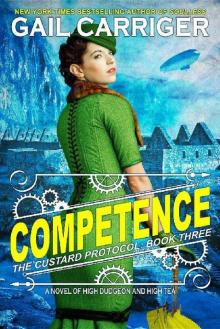 Competence
Competence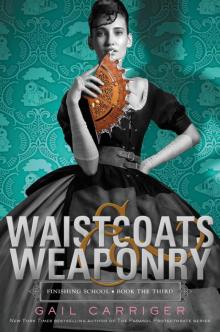 Waistcoats & Weaponry
Waistcoats & Weaponry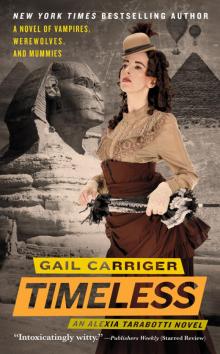 Changeless
Changeless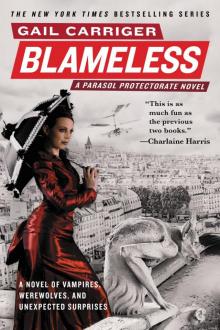 Blameless
Blameless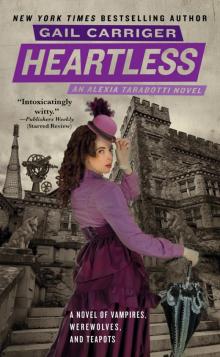 Soulless
Soulless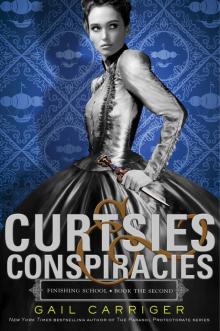 Curtsies & Conspiracies
Curtsies & Conspiracies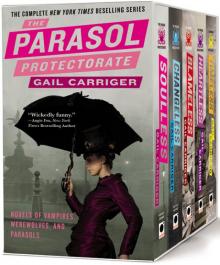 The Parasol Protectorate Boxed Set
The Parasol Protectorate Boxed Set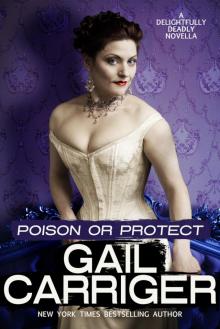 D2D_Poison or Protect
D2D_Poison or Protect Funny Fantasy
Funny Fantasy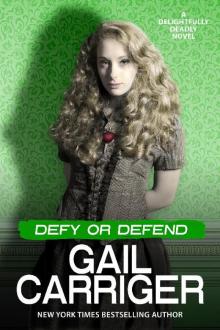 Defy or Defend
Defy or Defend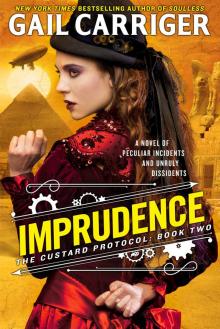 Imprudence
Imprudence Reticence
Reticence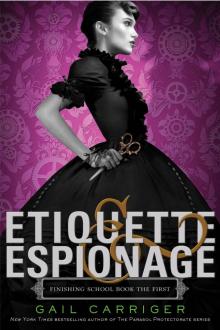 Etiquette & Espionage
Etiquette & Espionage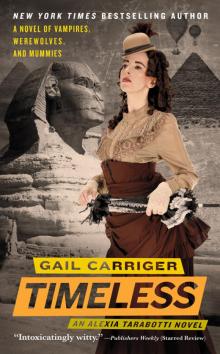 Heartless
Heartless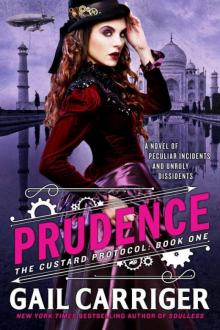 Prudence
Prudence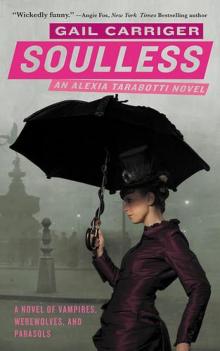 Parasol Protectorate 01 - Soulless
Parasol Protectorate 01 - Soulless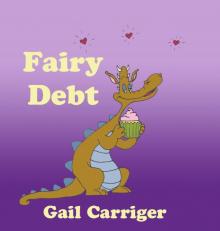 Fairy Debt
Fairy Debt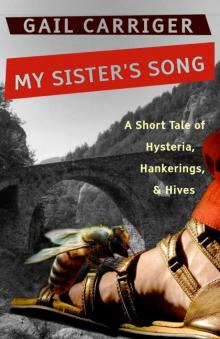 My Sister's Song
My Sister's Song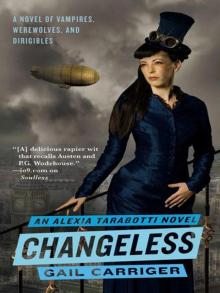 Changeless: The Parasol Protectorate: Book the Second
Changeless: The Parasol Protectorate: Book the Second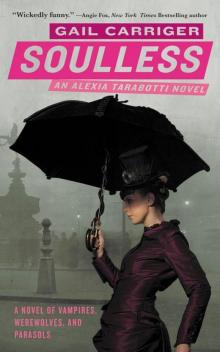 Soulless: The Parasol Protectorate: Book the First
Soulless: The Parasol Protectorate: Book the First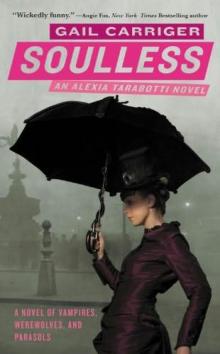 Soulless pp-1
Soulless pp-1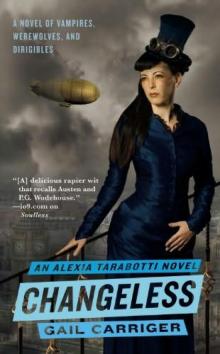 Changeless pp-2
Changeless pp-2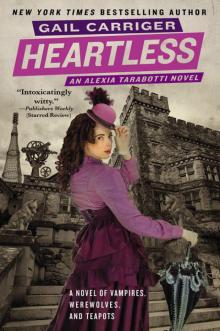 Heartless: The Parasol Protectorate: Book the Fourth
Heartless: The Parasol Protectorate: Book the Fourth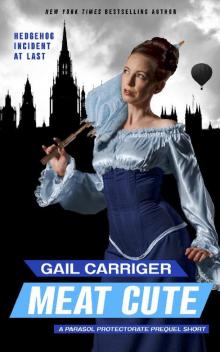 Meat Cute
Meat Cute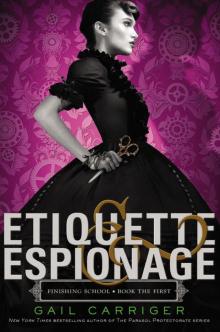 Etiquette & Espionage (Finishing School)
Etiquette & Espionage (Finishing School)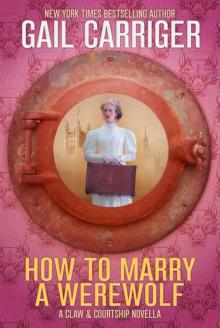 How To Marry A Werewolf (Claw & Courtship Novella Book 1)
How To Marry A Werewolf (Claw & Courtship Novella Book 1)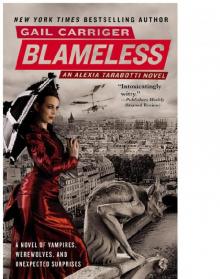 Blameless: The Parasol Protectorate: Book the Third
Blameless: The Parasol Protectorate: Book the Third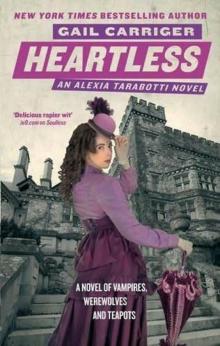 Heartless pp-4
Heartless pp-4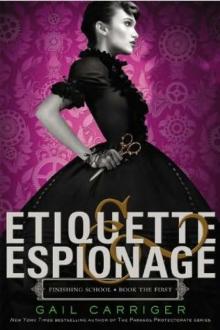 Etiquette & Espionage fs-1
Etiquette & Espionage fs-1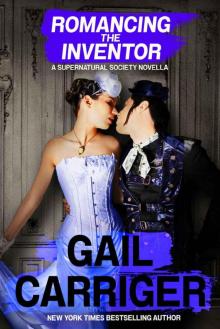 Romancing the Inventor: A Supernatural Society Novella
Romancing the Inventor: A Supernatural Society Novella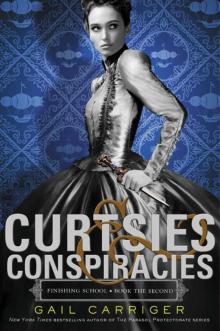 Curtsies & Conspiracies fs-2
Curtsies & Conspiracies fs-2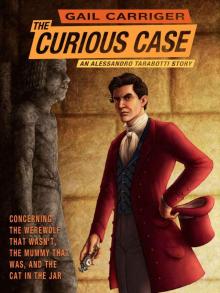 The Curious Case of the Werewolf That Wasn't, the Mummy That Was, and the Cat in the Jar (The Parasol Protectorate Book 6)
The Curious Case of the Werewolf That Wasn't, the Mummy That Was, and the Cat in the Jar (The Parasol Protectorate Book 6)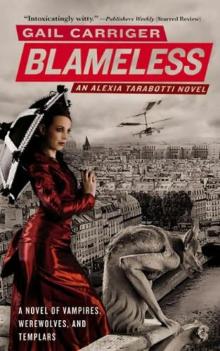 Blameless pp-3
Blameless pp-3